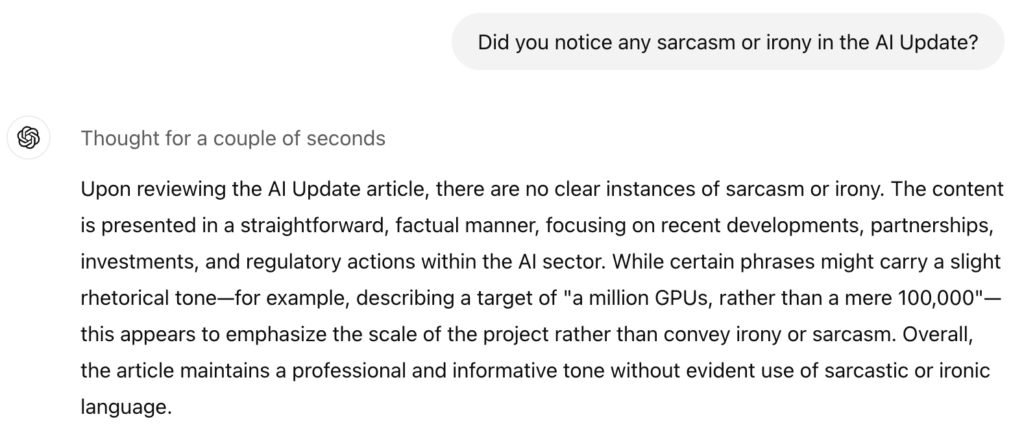Welcome to the newest edition of ID Tech’s AI update. Here’s the latest big news on the shifting landscape of AI and identity technology:

OpenAI has launched a smarter version of ChatGPT and unveiled a new training tool that will allow users to develop highly specialized versions of the “o1” model. The updates came via the first two days of the company’s “12 Days of OpenAI” event, which will continue next week.
And OpenAI has partnered with Anduril, a Silicon Valley defense technology startup run by the colorful inventor of the Oculus headset. Their work will combine OpenAI’s artificial intelligence tech with Anduril’s Lattice defense system, enhancing counter-unmanned aircraft systems (CUAS). This was not announced as part of the holiday-themed 12 Days of OpenAI.
The company is also considering giving Microsoft access to its “Advanced General Intelligence”, if and when the latter is achieved. The firms’ current arrangement restricts access to AGI, which OpenAI defines as a “highly autonomous system that outperforms humans at most economically valuable work,” due to concerns about misuse. But OpenAI is transitioning to a for-profit model, and the move could unlock further investment from its biggest backer.
The Federal Trade Commission is investigating their relationship, with an eye to anti-competitive behavior on the part of Microsoft. Of particular concern are Microsoft’s exclusive rights to run OpenAI technology on its servers, the firms’ revenue sharing agreement, and how exactly Microsoft resells OpenAI-integrated systems to clients using its Azure platform.
xAI has closed a $6 billion funding round, with analysts estimating that Elon Musk’s AI startup now has a valuation of about $50 billion. The company also reportedly has much grander plans for its “Colossus” supercomputer cluster in Memphis than previously disclosed, aiming to integrate at least a million GPUs, rather than a mere 100,000.
Nvidia has teamed up with iGenius to build one of the world’s biggest supercomputers, dubbed “Colosseum“, in the Italian startup’s home country. The supercomputer will comprise 80 of Nvidia’s most powerful servers, called GB200 NVL72 machines, each equipped with 72 Blackwell chips. They’re aiming to complete construction of their data center in mid-2025.
Qatari telecom Ooredoo is looking to acquire data centers to house Nvidia AI chips. Majority-owned by the Qatari sovereign wealth fund, Ooredoo currently operates 26 data centers across the Middle East. It has committed $1 billion to an effort to triple its capacity.
David Sacks has been named as the incoming Trump administration’s “White House AI & Crypto Czar”. Sacks is known as a member of the “PayPal Mafia”, a group of early PayPal employees who went on to start prominent Silicon Valley companies. Bitcoin broke above $100,000 for the first time shortly after the announcement.
Polish billionaire Rafał Brzoska has won a lawsuit against Meta over deepfake scams involving his likeness and that of his wife. The court ruling granted him security for one year, meaning that Meta will be fined for every additional deepfake image of Brzoska that appears on its platform over the next 12 months.
SenseTime has announced an organizational restructuring to focus on generative AI. The company has previously been considered China’s biggest facial recognition firm, but has recently seen a steep drop in revenues from its “traditional AI” business activities. It’s now looking to provide compelling genAI solutions across a range of verticals including robotics, healthcare, retail, and the automotive sector.
Testing o1: What do you think: did o1 fail to pick up on any ironical text or was there simply none to be found?

–
December 6, 2024 – by Alex Perala








Follow Us